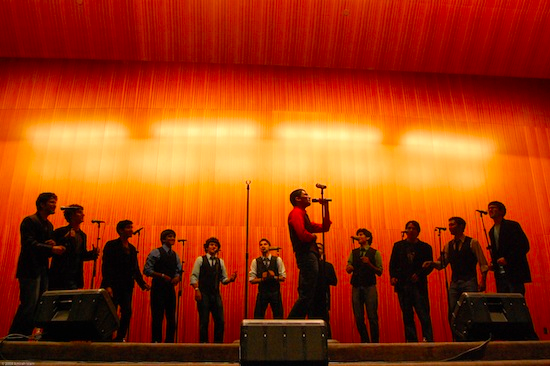By Madhura Karnik
Indian music is being increasingly fused with Western pop in an effort to take it global.

For South Asians living in New York City, YouTube is no longer the popular source for traditional music. As the indigenous Indian ‘curry’ has made its way into Michelin star restaurants, so has Indian and Pakistani music into the City’s clubs.
Events like Basement Bhangra and groups like Penn Masala are not only getting Indian and Pakistani music some recognition but have developed a new sect of music. This music brings the Indian and western cultures together to bring out a new form of music.
Basement Bhangra started 12 years ago when Rekha Malhotra, aka DJ Rekha, along with her cousins started mixing traditional Bhangra music with western beats at family gatherings and small community events. Bhangra is a form of Punjabi music, which originated in the Punjab state of India, and also some parts of Pakistan. The music has a very specific rhythm, with drumbeats dominating the music, to it and is generally the preferred music for dancing.
Today, Basement Bhangra is much more popular and generally takes place at SOB’s in SoHo. Other times, Rekha performs all over the country.
At Basement Bhangra events, the crowd swings to Indian and Pakistani Bhangra music, while some of them lead others onto the stage.
Bhangra, a form of music and dance in the northern part of India, is very popular in the U.K., which has a sizeable Punjabi community. However, not many in the U.S. know that Bhangra is not only Indian music, but is a very traditional and distinct form of Indian music. And Basement Bhangra is trying to popularize the music form in the country by blending it with pop beats.
The entry to any of Basement Bhangra events is inexpensive, with ticket prices starting from $5 to $15.
While Basement Bhangra is trying to rework an existing form of music, a cappella group Penn Masala, is giving a cappella the Indian twist. The first Indian a cappella group, Penn Masala, was started by American Indian Penn State University students.
“The four founders wanted to create an entirely new genre of music that fused influences from their South Asian heritage and American upbringing, giving birth to South Asian a cappella,” said Varshil Patel, business manager of Penn Masala in an interview.
Today the group has seven albums to its credit and the eighth one is up for release in early 2013. The group generally tours universities but has performed all over the world, including a performance for President Barack Obama at the White House.
This form of music is especially popular in college campuses around the country and the founders chose a cappella because it complemented their vision of fusing South Asian and Western music styles, Patel says.
Penn Masala performs Bollywood songs a cappella style, sometimes fusing them with pop hits.
Penn Masala’s target audience is mainly Asian-American high school and college students in the United States. It performs at various college campuses across the US.
You can check the tour schedule here.

